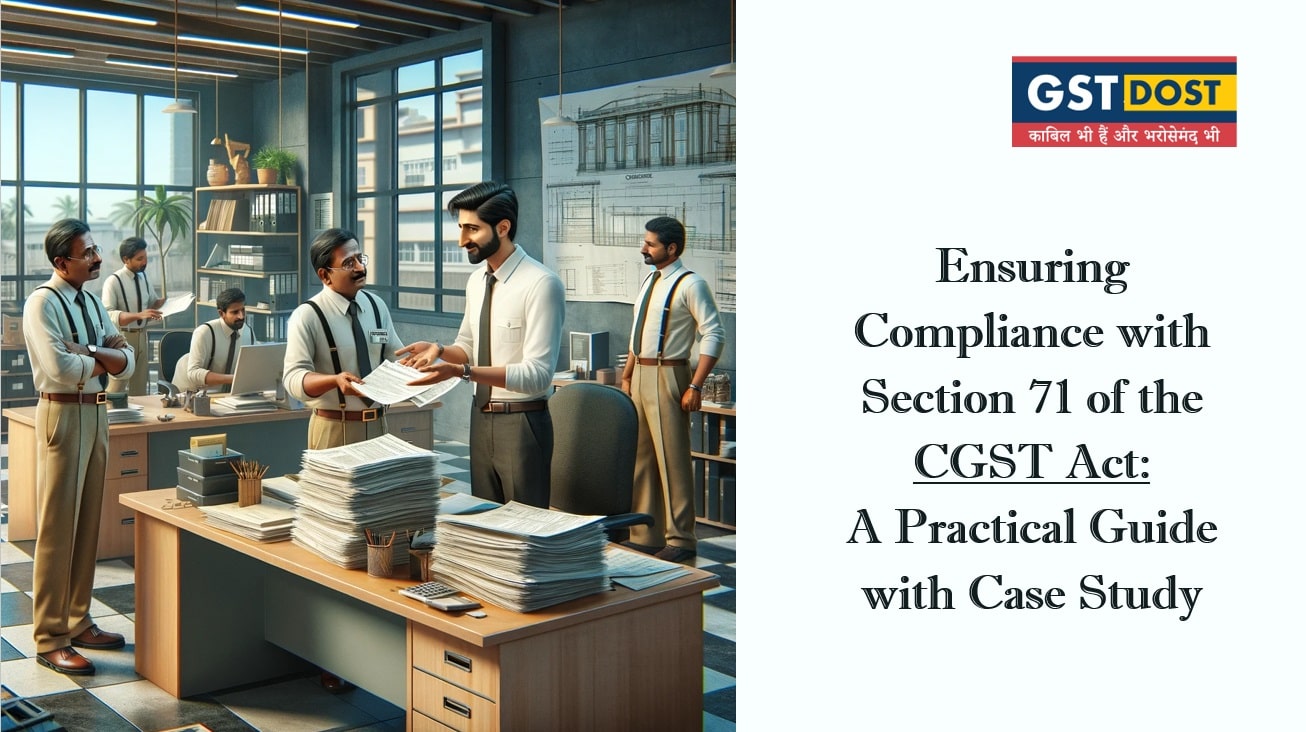Ensuring Compliance with Section 71 of the CGST Act: A Practical Guide with Case Study
GST DOST's BLOG

Namaste DOST!
Understanding Section 71: A Simplified Explanation for Business Owners
Section 71 of the Central Goods and Services Tax (CGST) Act empowers authorized GST officers to visit the business premises of GST-registered individuals and examine their books of account, documents, and electronic records. This provision aims to ensure that accurate sales reporting, correct Input Tax Credit (ITC) availing, and tax payments are being made to the government. The officers have the right to inspect all records and documents related to GST compliance, and non-compliance can result in penalties and further legal action.
Key Obligations Under Section 71: What You Need to Know
Under Section 71 of the GST Act, businesses are obligated to allow GST officers to enter and inspect their premises and provide access to all relevant records and documents. These may include sale invoices, purchase invoices, stock registers, ITC registers, trial balances, audited balance sheets, GST returns, IT returns, tax audit reports, etc. If unable to provide the documents immediately, businesses can request additional time with a genuine reason and must typically provide the requested documents within 15 working days or allowed extension time. Failure to comply may result in consequences such as issuing a Discrepancy Memo and a request for tax payment.
Case Study: "Gourmet Delights" Navigates Section 71 Inspection
During a routine inspection to verify compliance with GST regulations, a GST officer authorized under Section 71 visited the main outlet of the "Gourmet Delights" bakery chain. The officer requested several documents, including the income-tax audit report under section 44AB of the Income-tax Act, 1961, and the cost audit report under section 148 of the Companies Act, 2013.
To comply with the request, "Gourmet Delights" had to compile and present these documents within 15 working days. The bakery chain's management team swiftly arranged a meeting with their accounting team and GST Consultant to meet the deadline. The team reviewed their records to ensure all requested documents were accurate and up-to-date.
They worked diligently to compile the necessary documents, including the trial balance, financial statements, and audit reports. The process required the team to conduct a thorough cost audit under section 148 of the Companies Act, 2013 and an income tax audit under section 44AB of the Income-tax Act, 1961.
"Gourmet Delights" successfully provided all requested documents to the GST officer within the stipulated deadline. The officer conducted the Access without finding any discrepancies, affirming the bakery chain's compliance with GST laws. This safeguarded "Gourmet Delights" against potential penalties and reinforced its reputation as a responsible business entity.
Lessons Learned from "Gourmet Delights" in Case of Registered Business
The case study "Gourmet Delights" highlights some valuable lessons for registered businesses. First and foremost, being well-prepared is crucial, as GST Officials may visit any place where business is carried out or books are maintained. Therefore, keeping all the necessary documents and records up-to-date and readily available is imperative.
Additionally, businesses registered under the GST regime must understand their obligations and expectations regarding this matter. Hence, it is recommended that all documents and records be accurate and updated to avoid potential issues.
Furthermore, to ensure a smooth and hassle-free process, it is essential to cooperate fully with regulatory authorities during a Visit. A comprehensive and cordial approach towards the authorities, such as submitting requisite documents and information within the deadline, can mitigate any discrepancies that may arise.
Conclusion: Embracing Compliance as a Responsible Business Owner
Businesses must follow guidelines as mentioned earlier and be proactive about regulatory compliance to ensure the smooth functioning of their operations. Section 71 of the CGST Act plays a crucial role in maintaining fairness and compliance in the GST system. Understanding your obligations and preparing accordingly can help you confidently navigate these Visits. These checks not only ensure compliance but also provide opportunities to demonstrate your commitment to running a transparent and responsible business.
Best Regards,
DOST Vikash Dhanania

Allahabad High Court Provides Relief to Businesses in Landmark GST e-Way Bill Ruling. [News]
GST Amnesty Scheme: A Golden Opportunity, But Heed the Advisory - Tax Samachar [News]
Madras High Court Quashes ITC Claim Rejection Based Solely on GSTR-3B and Directs Authorities to Consider Other Returns like GSTR 2A and GSTR 9. [Blog]
Supreme Court Upholds Statutory Immunity for Officers Under GST Act: A Closer Look at the Landmark Decision [Blog]
Consultant के Foreign Client पर GST का Impact [Video]
Goods Transport Agency और Multimodel Transporter अलग अलग है [Video]


